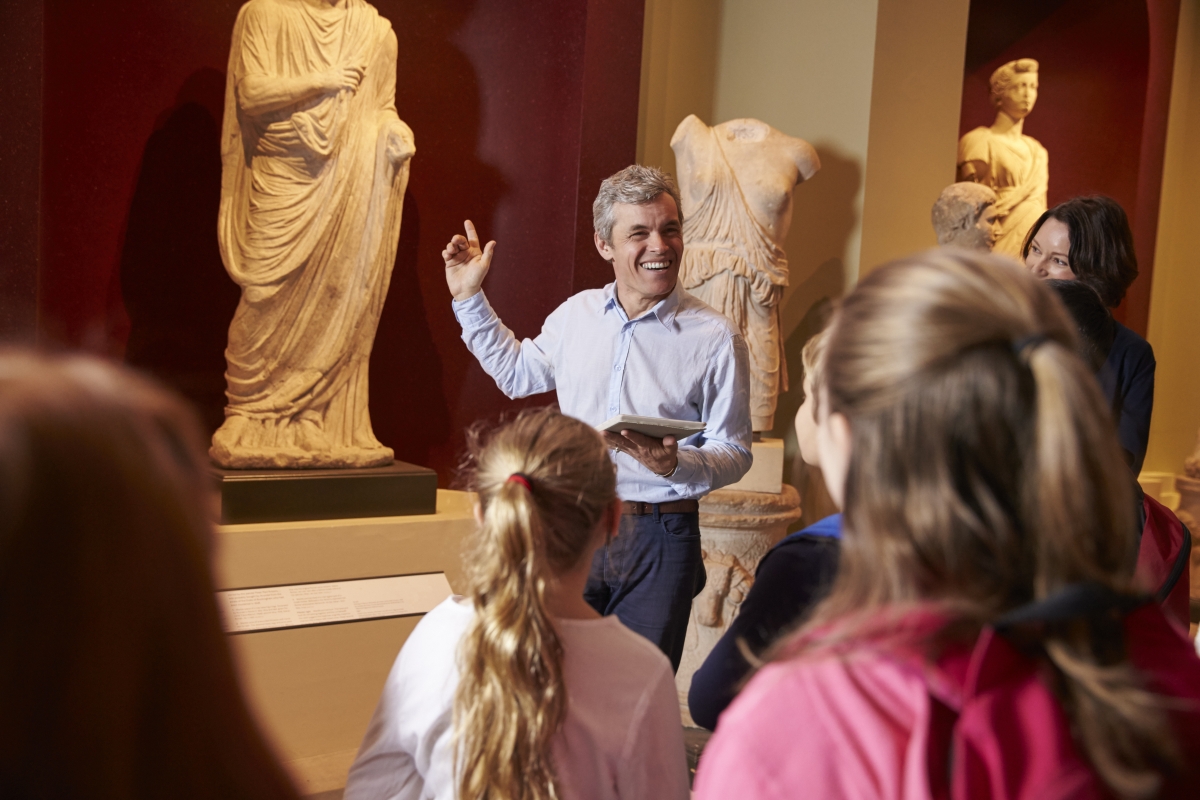Career Overview
Conservators and curators work in museums, art galleries and universities. Conservators:
- Restore and conserve artifacts belonging to museums, galleries and owners of cultural property
- May be self-employed
Curators:
- Recommend the acquisition of museum and gallery artifacts
- Research the artistic history of artifacts
Job Titles
Duties
Conservators:
- Examine artifacts, determine their condition, suggest methods for treating them and recommend preventive conservation techniques to their owners
- Restore and conserve paintings, photographs, sculptures, furniture, pottery and other museum and art gallery artifacts
- Give advice on display and storage of museum and gallery artifacts to make sure they are properly maintained and preserved
- Research new conservation and restoration techniques
- Consult with museums, art galleries or private individuals
- Supervise conservation technicians and other museum technicians
Curators:
- Recommend acquiring paintings, photographs, sculptures, documents and other museum and art gallery artifacts
- Research origins and artistic history of artifacts
- Develop storylines and themes and organize displays and exhibitions
- Coordinate the storage of collections and set up of displays and exhibitions
- Oversee the conservation, display and circulation of collections
- Supervise curatorial assistants and other museum technicians
Special duties
Conservators and curators may specialize in a particular type of collection or material, such as furniture, weapons, books, paintings and musical instruments.
Earnings
Earnings is income that workers receive in exchange for their labour. Depending on the type of employment, earnings can be in the form of wages (hourly), salaries (fixed monthly or annual) or self-employed earnings.
Work Environment
# Workers Employed
365% Employed Full Time
58%Work takes place in a conventional indoor setting.
Career Pathways
Progression to museum or art gallery management positions is possible with experience.
Related Careers
Occupational Interests
It’s important to understand what kinds of occupations align with your interests.
For more about occupational interests visit Skills for the Future Workforce > Characteristics.
Here are the top occupational interest(s) for this career profile:
Education, Training and Skills
- Conservators require a master's degree in art conservation
or
Completion of a three-year college program in conservation technology and several years of experience in conservation work - Curators require a master's or bachelor's degree in museology, art history or a field related to their specific area of work
Education programs in B.C.

Skills
Every job calls for a certain set of skills. Knowing those skills is the first step in finding a good career fit.
Here, you will find the 10 most relevant workplace skills. Some are more important to achieving success in a certain career than others. These skills may come naturally to you or you may need to gain them through education, training and experience.
See the list of work-related skills below, ranked in order of importance for this career. Check out the list and see if this career matches your skills—take that first step!
Giving full attention to what other people are saying, taking time to understand the points being made, asking questions as appropriate, and not interrupting at inappropriate times.
Understanding written sentences and paragraphs in work-related documents.
Talking to others to share information effectively.
Communicating effectively in writing as appropriate for the needs of the audience.
Using logic and reasoning to identify the strengths and weaknesses of alternative solutions, conclusions or approaches to problems.
Being able to solve novel, ill-defined problems in complex, real-world settings.
Considering the relative costs and benefits of potential actions to choose the most appropriate one.
Keeping track of and assessing your performance, other individuals, or organizations to make improvements or take corrective action.
Understanding how new information could be used to solve current and future problems in making decisions.
Choosing and using training, instructional methods and procedures appropriate for the situation when learning or teaching new things.
Labour Market Statistics
Discover data, facts and information that have been gathered and analyzed. Learn about the characteristics of the economy and labour market in B.C.
Employment
Find out about employment types and trends by region and industry.
Employment
365Employment by Region







| Region | Employment | % Employment of this Occupation |
|---|---|---|
| Cariboo | 10 | 2.8% |
| Kootenay | 10 | 2.8% |
| Mainland/Southwest | 210 | 58.3% |
| North Coast and Nechako | 15 | 4.2% |
| Northeast | 0 | 0.0% |
| Thompson-Okanagan | 35 | 9.7% |
| Vancouver Island/Coast | 80 | 22.2% |
Labour Market Outlook
The B.C. Labour Market Outlook is a 10-year forecast of the expected supply and demand for labour in the province. It’s usually updated every year. The purpose is to provide British Columbians with the knowledge to make informed decisions on careers, skills training, education and hiring.
Forecasted Job Openings (2024-2034)
140Forecasted Job Openings
Forecasted Employment Growth Rate
Composition of Job Openings
Job Openings by Region (2024-2034)







| Region | Job Openings | Avg. Annual Employment Growth |
|---|---|---|
| Cariboo | Not available | Not available |
| Kootenay | Not available | Not available |
| Mainland/Southwest | 100 | 1.6% |
| North Coast and Nechako | Not available | Not available |
| Northeast | Not available | Not available |
| Thompson-Okanagan | 20 | 2.1% |
| Vancouver Island/Coast | 30 | 1.1% |
Industry Highlights
Learn about the opportunities in B.C.'s major industries, including employment trends, earning potential, locations of work and more.
Forecasted Job Openings by Industry
| Industry | Job Openings (2024-2034) |
|---|---|
| Information, Culture and Recreation | 120 |
| Professional, Scientific and Technical Services | 10 |
| Retail Trade | 10 |
| Public Administration | 10 |
Resources
-
Canadian Public Relations Society (CPRS)www.cprs.ca
-
Editors' Association of Canadawww.editors.ca
-
Editors' Association of Canada – British Columbia Branchwww.editors.ca/branches/bc/index.html
-
Federation of BC Writerswww.bcwriters.com
-
Media Job Search Canadawww.mediajobsearchcanada.com
-
Periodical Writers Association of Canadawww.pwac.ca
-
The Magazine Association of BCmagsbc.com
-
Writers Guild of Canadawww.writersguildofcanada.com
-
Writers Union of Canadawww.writersunion.ca








